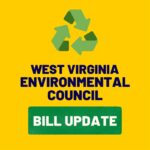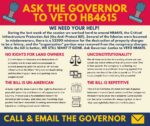- Share on Facebook
- Like
- Digg
- Tumblr
- VKontakte
- Buffer
- Love This
- Odnoklassniki
- Meneame
- Blogger
- Amazon
- Yahoo Mail
- Gmail
- AOL
- Newsvine
- HackerNews
- Evernote
- MySpace
- Mail.ru
- Viadeo
- Line
- Comments
- SMS
- Viber
- Telegram
- Subscribe
- Skype
- Facebook Messenger
- Kakao
- LiveJournal
- Yammer
- Edgar
- Fintel
- Mix
- Instapaper
- Copy Link
- Bluesky
It took us a few days to decompress to compile everything that’s happened over the last 60 days. Here’s a breakdown of the most important bills we worked on.
Positive news or, news that’s not all bad:
SB35 – Limiting civil penalty for littering conviction to $2000. This bill passed, which we considered “good’ because local law enforcement feedback was that law was not being enforced because of high penalties. *Note this did not affect fines for littering, just the civil penalties.
SCR46 – Requesting DEP and DHHR propose public source-water supply study plan (11th hour win!) This Senate Concurrent Resolution authorizes DEP to work with DHHR to conduct a sampling and study of untreated (raw) water at 259 water treatment plants around the state to determine where the forever chemicals PFAS might be located.
SB120-Establishing priorities for expenditures for plugging abandoned gas or oil wells. This bill passed and anything that helps plug abandoned wells, without creating the potential for MORE abandoned wells, we see as a win.
SB275-Creating Intermediate Court of Appeals. This was a priority for the Republican majority, but would have created barriers to justice for many. Though we didn’t work directly on this bill, we did highlight to legislators the various better ways the money this would have cost could be spent benefitting West Virginians.
SB316-Relating to oil and gas conservation commission membership. This bill would have taken important areas of expertise out of the requirements for commission membership. It died and we’re glad it did.
SB583- Creating program to further development of renewable energy resources. This bill passed and allows the state’s two electric utilities (First Energy in the form of Mon Power/Potomac Edison, and AEP in the form of Appalachian Power) develop 200MW each of solar generation. (Senate version of Hansen/Hanshaw bill)
SB829-Establishing Overland Recreation Fund. This would have created a fund to promote Overland Recreation (off-highway vehicle recreation). There was no source of funding identified, but we were glad it died because we are constantly wary of these vehicles inching their way (legally) onto public lands.
SB589-Creating Critical Needs/Failing Systems Sub Account. Senator Jeffries’ bill to create a fund to address the most serious water/sewer projects across the state passed and will help communities strengthen their infrastructure.
SB690-Permitting street-legal special purpose vehicles on highways. This bill was introduced to promote “overlanding,” a form of off-highway vehicle recreation. It was changed dramatically when the Division of Natural Resources and environmental groups weighed in to say “no vehicles on our public lands!” When it passed, it simply defined special purpose vehicles and allowed them on public highways in a limited manner.
HB4079-Altering the definition of an aboveground storage tank (WIN!!!) This terrible bill, introduced on the anniversary of the Freedom Industries’ chemical leak, exactly six years to the day, would have deregulated oil and gas aboveground storage tanks closes to drinking water sources. Thanks to YOU, this bill never made it onto the agenda of its only reference: House Energy. This is remarkable because the bill was sponsored by the committee Chairman Bill Anderson and Vice-chair John Kelly.
HB4088-Disposition of funds from certain oil and natural gas wells due to unknown or unlocatable interest owners. This bill puts money into the abandoned well fund. We like that.
HB4217-Authorizing the Department of Environmental Protection to promulgate legislative rules. We were glad the DEP rules ran and passed, as the agency often worries about maintaining primacy in its programs. However, we anticipate that this rule, as it relates to mine subsidence, may not pass muster with the Office of Surface Mining Reclamation and Enforcement (OSMRE) (which we agree it should not), so look for more on this later.
HB4443-Shifting funding from the Landfill Closure Assistance Fund to local solid waste authorities (study resolution). This bill and its Senate counterpart, comes back year after year. It seeks to take money from the WV DEP’s LCAP program and return it to local Solid Waste Authorities. The kicker is that almost all, save two, of the SWA’s oppose this move. This was sent into interim study and hopefully will lead to resolution once and for all.
HB4484-Relating to the Hazardous Waste Management Fund. This bill extends the termination date of the Hazardous Waste Management Fund from 2020 to 2025.
HB4634-Southern West Virginia Lake Development Study Commission Act. This bill authorizes a study that is bound to be controversial, so this isn’t necessarily “good,” but we were able to see that it was amended to put scientific experts on the study commission. Now there will be experts on hydrology and ecology in the mix. Thanks to Senator Facemire who made this amendment in Senate Natural Resources!
HB4690-Relating to solid waste facilities. Ugh. This bill was a trash heap! The bill would have allowed the former Fola mine site in Clay county to begin accepting solid waste via rail from the Northeastern United States. The bill excluded landfills that are: owned and operated by a person for the sole purpose of the disposal, processing or composting of solid wastes owned and transported at least 80 percent by rail and which is situated on a site requiring one or more NPDES permits and to fulfill a water treatment obligation being held by the West Virginia Department of Environmental Protection from the definition (and therefore regulation) of “commercial solid waste facility.” This bill died a timely death after your calls and emails flooded the Capitol!
Bad News:
SB 793-Relating to B&O taxes imposed on certain coal-fired electric generating units. This bill is another tax break for coal-fired power plants similar to the one given to the Pleasants Power Station last year, but this time for all other coal-fired plants in the state, save for Longview. We don’t know how the state keeps coming up with ways to take money out of our communities and put it into the pockets of industry, but it does.
SB 611-Permitting third-party ownership of renewable and alternative energy generating facilities. This is our beloved power purchase agreement (PPA) bill that would have made solar more accessible to residents, businesses, and tax-exempt organizations. We will continue to work on creating a better environment for renewables throughout the year!
SB 802-Relating to public utilities generally (PPAs for large gas users) Despite the push against PPAs by utilities and the PSC, nevertheless a bill allowing large gas users to bypass utilities and buy directly from producers passed both houses and became law. We say these deals are indeed power purchase agreements, but ones that benefit the oil/gas industry and downstream manufacturing, not the people!
SB 810- Implementing federal Affordable Clean Energy rule (We don’t love this, but it is what it is. This allows DEP to promulgate rules for Trump EPA “clean energy” plan (ACE) instead of Clean Power Plan.
SB 816-Updating North American Industry Classification System code references. Kayla was particularly interested in this bill, that otherwise may have slipped by unnoticed by the WVEC. It changed certain tax code identifiers to allow oil and gas even more tax advantages. Something we saw too much of this year, unfortunately.
SB 840- Permit modification fees. This bill would have allowed the WV DEP to recoup a fee from oil and gas well work permit holders of $2500 per modification. The bill would have created revenue which the DEP’s Office of Oil and Gas could have used for enforcement.
HB 4001-Creating West Virginia Impact Fund. Some of the WVEC member groups opposed this bill, which was known as the Speaker’s bill and his highest priority. Kayla and I had a hard time getting our arms around how to effectively lobby against this bill that enjoyed such broad support in both houses. Here’s a breakdown of the bill after it passed the House by Brad McElhinny. The Governor signed this bill yesterday.
HB 4091- Allowing for expedited permitting upon payment of applicable expedited fees. This bill allows oil and gas well drillers to move their permit applications to the front of the line of the WVDEP’s Oil & Gas permitting program. The fees are as follows: $20k for the initial well and $10k for additional wells at same location. This will result in 45 day turnaround for permit. We think this bill encourages more drilling, but does not return the amount of revenue required for DEP resources in its Oil & Gas program. This could have been mitigated by the passage of SB 840, allowing for permit modification fees.
HB 4221-Natural Gas Liquids Economic Development Act. Simply, more tax breaks for natural gas liquid storers and transporters.
HB 4439-Clarifying the method for calculating the amount of severance tax attributable to the increase in coal production. This is a tax break for met coal producers similar to the break thermal coal producers were given last year.
HB 4542 / SB679-Creating Clean Drinking Water Act of 2020 (Watered down to SCR 46) This bill would have established PFAS water quality criteria to set safe limits on the amount of PFAS chemicals allowed in our water supplies; set a statewide maximum contaminant level for PFAS; required polluters to report and monitor their use of PFAS; and created an interagency WV PFAS Response Team. Thank you to Delegate Hansen and Senator Ihlenfeld on this important legislation. Unfortunately, there was resistance to this bill and it did not go anywhere, but thankfully SCR 46 will allow West Virginia to take some proactive steps in addressing the problem of PFAS.
HB 4574-Establishing Just Transition support for coal and timber related jobs. This bill was supported by the Secretary of Commerce and would have been a way for an advisory panel to help identify and manage funds available to stimulate the economies in the communities hardest hit by the decline in coal jobs. It passed the House easily, but was stopped in the Senate where it was sent to the Workforce Development committee that rarely met. We worked hard, along with some great citizen lobbyists, to get this on the agenda, but were unsuccessful.
HB 4615-West Virginia Critical Infrastructure Protection Act. Kayla can tell you about the name I had for this bill while we were in session: it’s not very polite. Generally, we called this the anti-protest bill. Seemingly meant to protect national security interests by stiffening penalties around trespassing on or damaging “critical infrastructure,” we know this is actually targeting pipeline protestors. Fortunately, we were able to wrangle bipartisan support in the Senate, making the bill more reasonable. Read up on how you can still take action on this bill in Kayla’s article in this newsletter.
HB 4787 – Updated Penalties for Water Quality Violations. This bill would have taken steps to deter polluters from breaking the law by allowing the WVDEP to increase penalties for repeated water quality violations on larger linear projects (like pipelines). We were unable to get it on an agenda.




